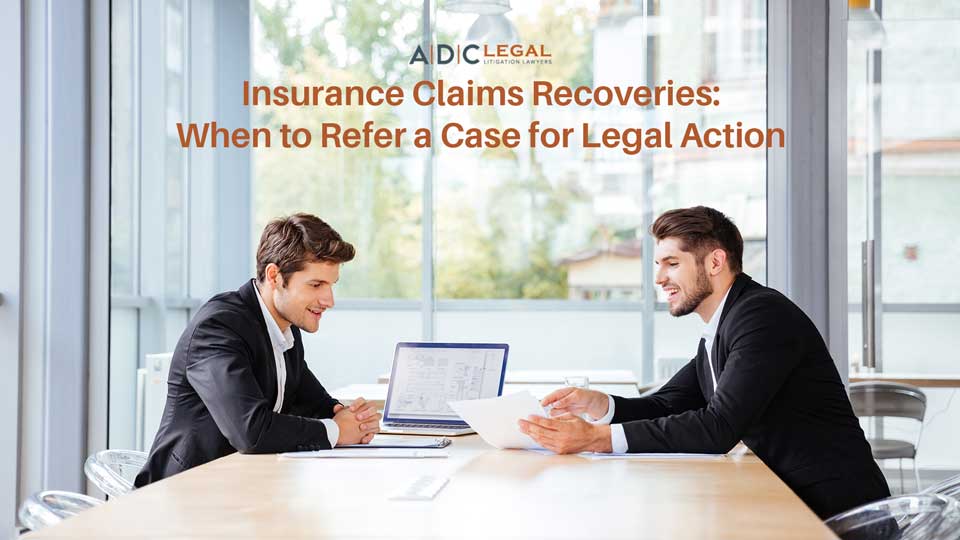
As an insurance claims recoveries veteran, I get asked this question a lot. When is a good time to send a case to a solicitor for recovery?
The claim may have already been through the usual recovery process, either internally, or with a “no win-no fee” agent, still no recovery. Whilst most debt collection agencies aim to make full recovery of all outstanding debts, there are occasions where normal debt recovery avenues are exhausted and legal action becomes an almost inevitable option.
As a debt collector, I acknowledge that not every case is worth litigating. At our debt collection agency, Debt Recoveries Australia, we have quite stringent internal guidelines on when to refer cases for legal action. So I will give you an idea of what process we go through, so you may have a better understanding of the steps involved.
Identifying potential legal matters
The collection of documentation or information has always been time sensitive, so our debt collection operators try to identify potential legal cases very early on. On such files that have strong potential to go legal, our operators attempt recovery of the debt by working closely with our solicitors at ADC Legal Litigation Lawyers (ADC) for guidance and free legal opinions to form better responses and maximise debt recovery. When all debt recovery avenues are exhausted, our solicitors will review the cases for a final time and provide legal opinions. To enhance the process of legal referrals, we have created a checklist below that demonstrates the strength of internal processes.
The Checklist
We have a comprehensive legal referral checklist that considers several factors before a file can be referred for legal action. Below are some of the factors that we consider before referring a file for legal action.
- Quantum (Amount of Debt)
We are mindful of the fact that passing a case to solicitors is going to be costly. For this reason and as a general rule, we only consider debts over $5,000 for legal action. However, this is not a strict rule and debts under $5,000 do occasionally get referred for legal action where a strong case is established against debtors. This is for instance where the debtor is a company, insured, or where we are in possession of critical information that individual debtors have high capacity to pay their debts.
- Whereabouts of the Debtors
In order to commence legal proceedings, a serviceable address is required for debtors to serve them with the relevant legal documents. Our debt collection staff are under strict direction to ensure that we have a service address for debtors before the matter is considered for legal action. Should a debtor’s whereabouts remain unknown, legal action will not be recommended.
- Means to pay the debt
Although on some large quantum files, we do recommend legal action where we have established a good case and have a serviceable address, we generally consider legal action in cases where we know that the debtors have the means to pay the debt in question.
The following are some of the actions our operators undertake to determine whether debtors have the means to pay their debts or otherwise whether the case is worth going legal on:
- Determine the age of the debtor (e.g. there is no point in suing an aged pensioner who has no means of repaying the debt);
- Determine whether the debtor is insured;
- Conducting comprehensive property searches on the property debtors live in and getting information such as owners details, price of the property and average rent price in the area;
- Conducting paid ASIC searches or title searches where we deem fit;
- Receiving and reviewing debtors financial statements and evaluating their financial capacity;
- Considering the age of a debtors vehicles, vessels, properties in anticipation that they may have insurance policies that would cover the debt; and
- Ascertaining whether the debtors are employed, self-employed or whether they own companies and contacting their employer or company to confirm same.
- Getting proof of income. (e.g. notice of govt income-if any)
The above checklist is for guidance purposes only as every case is weighed with accordance to its merits. Our operators conduct their work based on the materials they have but the checklist above is a minimum requirement to be followed by our operators. We also understand that on some occasions our clients may instruct us to proceed with legal action on matters where the debtors means to pay the debt is not established. We look forward to conducting our client matters and offer our full debt recovery and litigation services.
Need help? Contact Us.
If you prefer a professional to handle it, outsource immediately to us here at ADC Legal. Let us tell you how we can help your business! Email us at email@adclegal.com.au or call 1300 799 820. Talk to us about your litigation or dispute concerns via Skype at adclegal.
 | ABOUT THE AUTHOR Adam Stewart has worked in the fields of motor vehicle insurance and debt recovery for over 12 years, working with some of the largest insurance and debt recovery companies in Australia. In 2002, he established Debt Recoveries Australia Pty Ltd, a debt collection agency specialising in the insurance claims industry. Adam is also the owner of ADC Legal, a legal practice specialising in commercial advice and litigation, debt recovery and insurance claims recovery disputes. |
